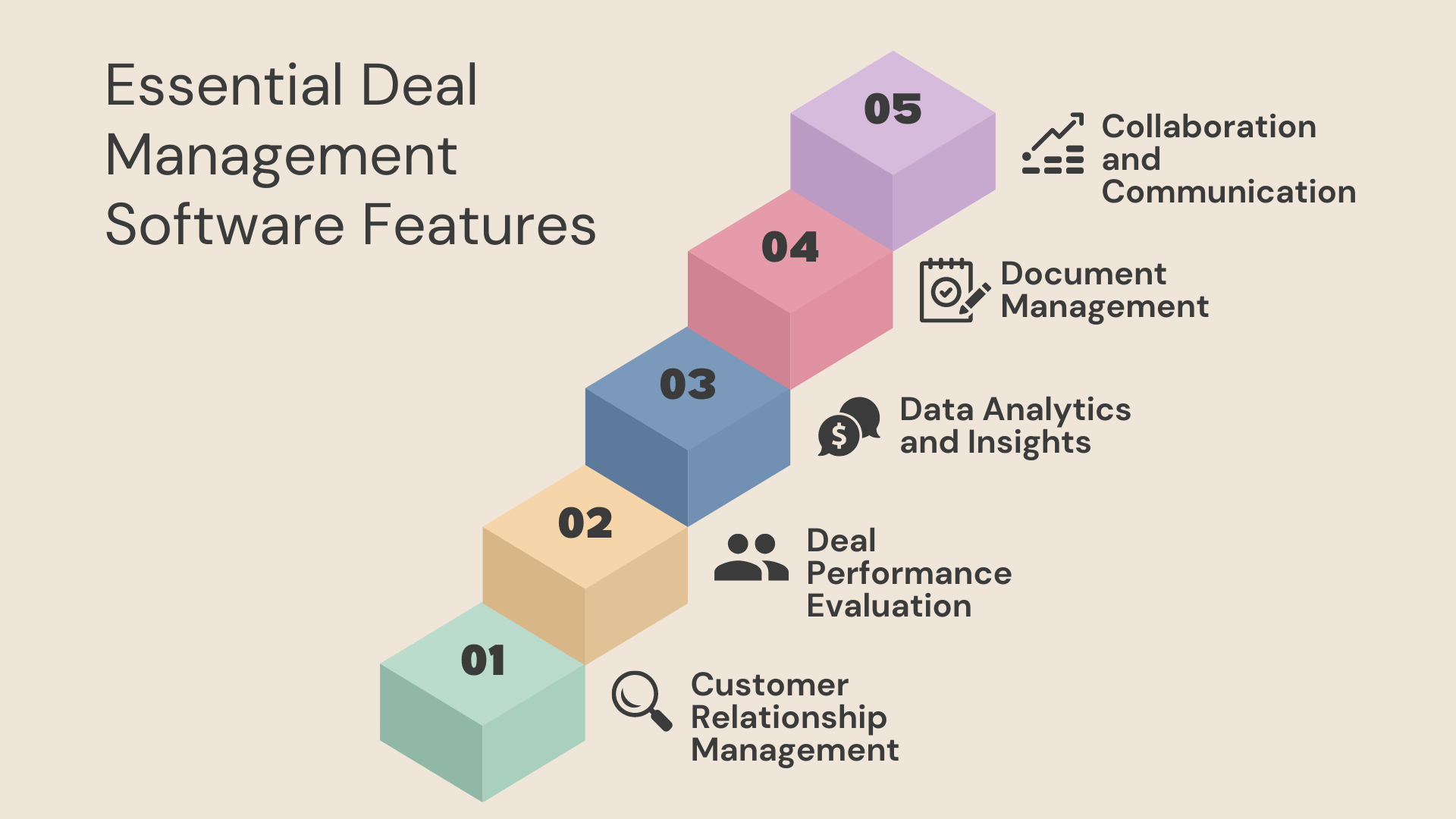
Home »
Why Deal Management Software is a Must-Have for Businesses?
Elevate sales efficiency, close deals faster, and drive revenue growth with this essential tool.
Introduction
In today’s competitive business landscape, success hinges on the ability to effectively manage deals and drive revenue growth. Deals, whether they involve sales, partnerships, or procurement, are the lifeblood of any organization. However, deal management can quickly become a complex and time-consuming process, especially when dealing with multiple stakeholders, vast amounts of data, and ever-changing market dynamics.
To navigate these challenges and unlock the full potential of their deals, businesses are turning to cutting-edge technology solutions: Deal Management Software. This transformative tool offers a comprehensive and streamlined approach to deal management, empowering companies to optimize their deal-making processes, enhance collaboration, and maximize profitability.
In this article, we will explore the undeniable benefits of adopting deal management software and why it has become an indispensable asset for businesses across industries.
What is Deal Management Software?
Deal Management Software is a specialized technology solution designed to streamline and optimize the process of managing deals and transactions within a business. It serves as a centralized platform that allows businesses to efficiently handle all aspects of deal-making, from initiation and negotiation to closure and post-deal analysis.
This software is particularly beneficial for companies that engage in various types of deals, such as sales deals, partnerships, mergers and acquisitions, procurement contracts, and more. Deal management software provides a range of features and functionalities that enhance collaboration, automate repetitive tasks, and offer valuable insights to help businesses make informed decisions.
Key features of Deal Management Software
Deal Tracking and Progress: It enables users to track the status and progress of deals in real-time, ensuring that all stakeholders are updated on the deal’s current stage.
- Collaboration and Communication: The software facilitates seamless communication and collaboration among team members involved in the deal, ensuring effective coordination and quick resolution of issues.
- Document Management: It allows for efficient storage, organization, and retrieval of crucial deal-related documents, contracts, and agreements.
- Data Analytics and Insights: Deal management software often provides analytics tools to analyze deal performance, identify trends, and make data-driven decisions to improve deal-making strategies.
- Deal Performance Evaluation: It enables businesses to evaluate the success of deals, identify factors contributing to successful deals, and learn from past experiences to improve future deals.
- Customer Relationship Management: Some deal management software solutions offer features to manage and nurture customer relationships during and after the deal process.

Importance of Deal Management in Business
Deal management plays a critical role in the success and growth of businesses, regardless of their size or industry. It serves as a strategic process that ensures efficient handling of deals, transactions, and negotiations, leading to improved profitability, enhanced customer relationships, and sustainable competitive advantages.
- Maximizing Revenue Generation: Effective deal management enables businesses to optimize their sales processes, leading to higher deal win rates and increased revenue generation. It helps identify and prioritize high-potential deals, ensuring that sales efforts are focused on the most promising opportunities.
- Streamlining Deal Lifecycle: Deal management streamlines the entire deal lifecycle, from prospecting and proposal creation to contract negotiation and deal closure. This leads to reduced deal cycle times, improved deal visibility, and better coordination among stakeholders.
- Mitigating Risks: Deal management involves careful assessment of contractual terms, legal compliance, and potential risks associated with deals. By identifying and addressing potential risks, businesses can minimize the chances of disputes and protect their interests.
- Accelerating Deal Closures: By streamlining the deal process and reducing administrative bottlenecks, deal management accelerates deal closures, enabling businesses to capitalize on opportunities promptly.
Streamlining the Deal Process
Streamlining the deal process is essential for businesses seeking to optimize their deal-making efficiency, reduce turnaround times, and enhance overall productivity. A well-organized and efficient deal process ensures that deals progress smoothly from initiation to closure, leading to improved deal win rates and increased revenue.
Implement a centralized deal management system that consolidates all deal-related information, documents, and communications in one place. This facilitates easy access, better organization, and real-time tracking of deals.
Utilize automation to streamline repetitive tasks in the deal process, such as generating proposals, sending notifications, and updating deal statuses. Automation reduces manual errors and speeds up the overall deal cycle.
Implement robust deal tracking tools and analytics to monitor deal performance and gain insights into deal conversion rates. Data-driven insights enable continuous improvement of the deal process.
Enhancing Sales Productivity
Enhancing sales productivity is a key objective for businesses aiming to maximize revenue and stay ahead in competitive markets. Sales productivity refers to the efficiency and effectiveness of the sales team in generating revenue and closing deals.
One way to enhance sales productivity is through the use of sales enablement tools and technologies. These tools provide sales representatives with easy access to relevant and up-to-date sales content, product information, and customer data, enabling them to engage with potential customers more effectively.
Additionally, sales automation software can streamline repetitive tasks, such as data entry, follow-up emails, and appointment scheduling, freeing up valuable time for sales reps to focus on building relationships and closing deals.
Furthermore, adopting a data-driven approach to sales allows businesses to make informed decisions based on sales analytics and insights. Analyzing sales data can reveal patterns and trends, helping sales teams identify high-value leads, prioritize sales efforts, and optimize their sales strategies for better results.

Securing Deals and Minimizing Risks
Securing deals and minimizing risks are critical objectives for businesses engaged in deal-making. Deals often involve complex negotiations, contractual agreements, and financial transactions, making it essential to have robust strategies in place to protect the interests of the company and mitigate potential risks.
One of the key aspects of securing deals is conducting thorough due diligence. Before entering into any deal, businesses must carefully assess the background, financial stability, and reputation of the parties involved. Performing due diligence helps identify potential risks and red flags that could impact the success of the deal.
Minimizing risks in deal negotiations involves understanding the interests and motivations of the other party. By empathizing with the needs and concerns of the counterparty, businesses can identify common ground and negotiate win-win solutions that foster trust and cooperation.
Moreover, businesses can reduce risks by diversifying their portfolio of deals and partnerships. Relying on a single high-stakes deal can expose the company to significant risks if it falls through. Spreading risks across multiple deals can create a more balanced and resilient business model.
Maximizing Deal Profitability
Maximizing deal profitability is a crucial goal for businesses aiming to optimize their financial performance and achieve sustainable growth. Successfully closing deals that yield higher profits not only enhances the company’s bottom line but also strengthens its competitive position in the market.
Conduct a thorough analysis of costs associated with delivering products or services for each deal. Implement cost-saving measures without compromising quality to improve the deal’s profitability.
Utilize data analytics and forecasting techniques to assess the potential profitability of each deal. Evaluate factors such as customer lifetime value, acquisition costs, and expected revenue streams to make informed decisions.
| Thorough Cost Analysis | Conduct a detailed analysis of costs related to delivering products or services for each deal. Identify cost-saving opportunities while maintaining quality to enhance deal profitability. |
| Cost-Saving Measures | Implement measures to reduce costs without compromising the quality of products or services. Efficient cost management directly contributes to improved deal profitability. |
| Data Analytics and Forecasting | Utilize data analytics and forecasting techniques to assess the potential profitability of each deal. Consider factors like customer lifetime value, acquisition costs, and expected revenue streams for informed decision-making. |
| Profit-Driven Decision-Making | Base decisions on maximizing profitability. Prioritize deals with higher profit margins and align strategies to focus on opportunities that contribute significantly to the company’s financial success. |
Enhanced Visibility
Enhanced visibility is a critical aspect of effective deal management and successful business operations. It refers to the ability to gain clear and real-time insights into various aspects of deals, processes, and performance. Having enhanced visibility empowers businesses to make informed decisions, identify opportunities, and proactively address challenges.
Enhanced visibility allows sales managers and executives to track the progress of deals in real-time. This includes information on the status of each deal, potential bottlenecks, and overall deal pipeline. With this visibility, sales teams can prioritize high-potential deals and allocate resources more effectively.
By accessing detailed performance metrics and analytics, businesses can gain valuable insights into deal conversion rates, sales trends, and customer behaviors. Data-driven decision-making becomes possible, leading to optimized strategies and improved results.
Improved visibility into the deal pipeline and sales data enables accurate sales forecasting. Businesses can anticipate future revenue, plan resources accordingly, and make strategic decisions to achieve their financial goals.
Cost Savings
Cost savings are a significant advantage of implementing efficient deal management processes. By streamlining deal workflows, automating repetitive tasks, and optimizing resource allocation, businesses can reduce administrative overheads and operational expenses.
Deal management software facilitates centralized data management, eliminating the need for manual data entry and reducing the risk of errors. Additionally, improved visibility into deal progress and analytics enables businesses to identify cost-effective strategies, prioritize high-value opportunities, and negotiate more favorable terms.
Through effective cost savings in deal management, businesses can allocate resources more strategically, increase overall profitability, and create a competitive edge in the market, while also ensuring a sustainable and financially efficient approach to deal-making.

KEBS – Deal Management

KEBS offers a comprehensive set of features to streamline various aspects of professional services automation.
- Workflow & Approval Automation: KEBS automates workflows and approval processes, eliminating procedural delays and ensuring instant and automated approvals. This streamlines business operations and increases efficiency by reducing manual intervention.
- Account 360: With the Account 360 feature, KEBS offers complete access to customer databases. This allows businesses to understand their customers better and deliver a frictionless end-user experience, improving customer satisfaction.
- Proposal Builder: KEBS includes a Proposal Builder tool that enables users to create customized proposals instantly. By generating highly effective proposal documents quickly, businesses can increase their chances of successful conversions.
- Sales Pipeline: The Sales Pipeline feature in KEBS facilitates efficient deal management, enabling businesses to close deals more effectively. It optimizes the sales process and improves lead-to-conversion ratios.
- Collaborative Forecasting: KEBS supports collaborative forecasting, allowing teams to predict sales revenue more accurately. With automated and data-driven forecasting, businesses can maximize revenue and profit margins.
- Costing Sheet: KEBS assists in managing available resources efficiently by providing a costing sheet feature. This enables businesses to recruit new associates according to their requirements, optimizing resource allocation.
- Book & Bill: The Book & Bill feature helps maintain an optimum book and bill ratio by automating data tracking. This ensures that financial data is accurately recorded, leading to better financial management.
| Workflow & Approval Automation | Automates workflows and approval processes, reducing delays and ensuring instant approvals for increased efficiency. |
| Account 360 | Provides complete access to customer databases, enabling businesses to enhance customer understanding and satisfaction. |
| Proposal Builder | Enables quick creation of customized proposals, improving the chances of successful conversions. |
| Sales Pipeline | Facilitates efficient deal management, optimizing the sales process and lead-to-conversion ratios. |
| Collaborative Forecasting | Supports collaborative sales revenue forecasting for accurate predictions and maximized revenue and profit margins. |
| Costing Sheet | Assists in resource allocation by providing a costing sheet for efficient management of available resources. |
| Book & Bill | Automates data tracking for accurate financial recording, optimizing the book and bill ratio for better financial management. |
Conclusion
In conclusion, Deal Management Software emerges as an indispensable tool for businesses aiming to thrive in today’s competitive landscape.
KEBS empowers businesses with the flexibility and visibility necessary to manage projects, resources, and finances effectively.
Streamline your quote to cash with KEBS!









